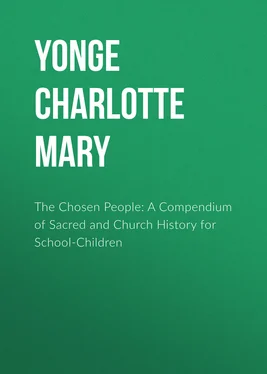Charlotte Yonge - The Chosen People - A Compendium of Sacred and Church History for School-Children
Здесь есть возможность читать онлайн «Charlotte Yonge - The Chosen People - A Compendium of Sacred and Church History for School-Children» — ознакомительный отрывок электронной книги совершенно бесплатно, а после прочтения отрывка купить полную версию. В некоторых случаях можно слушать аудио, скачать через торрент в формате fb2 и присутствует краткое содержание. Жанр: foreign_prose, foreign_religion, Философия, foreign_psychology, foreign_antique, на английском языке. Описание произведения, (предисловие) а так же отзывы посетителей доступны на портале библиотеки ЛибКат.
- Название:The Chosen People: A Compendium of Sacred and Church History for School-Children
- Автор:
- Жанр:
- Год:неизвестен
- ISBN:нет данных
- Рейтинг книги:4 / 5. Голосов: 1
-
Избранное:Добавить в избранное
- Отзывы:
-
Ваша оценка:
- 80
- 1
- 2
- 3
- 4
- 5
The Chosen People: A Compendium of Sacred and Church History for School-Children: краткое содержание, описание и аннотация
Предлагаем к чтению аннотацию, описание, краткое содержание или предисловие (зависит от того, что написал сам автор книги «The Chosen People: A Compendium of Sacred and Church History for School-Children»). Если вы не нашли необходимую информацию о книге — напишите в комментариях, мы постараемся отыскать её.
The Chosen People: A Compendium of Sacred and Church History for School-Children — читать онлайн ознакомительный отрывок
Ниже представлен текст книги, разбитый по страницам. Система сохранения места последней прочитанной страницы, позволяет с удобством читать онлайн бесплатно книгу «The Chosen People: A Compendium of Sacred and Church History for School-Children», без необходимости каждый раз заново искать на чём Вы остановились. Поставьте закладку, и сможете в любой момент перейти на страницу, на которой закончили чтение.
Интервал:
Закладка:
Well might such worship be called abomination, and the Israelites be forbidden to hold any dealings with those who followed it. As long as the generation lived who had been bred up in the wilderness, they obeyed, and felt themselves under the rule of God their King, Who made His Will known at Shiloh by the signs on the breastplate of the High Priest, while judges and elders governed in the cities. But afterwards they began to be tempted to make friends with their heathen neighbours, and thus learnt to believe in their false deities, and to hanker after the service of some god who made no such strict laws of goodness as those by which they were bound. As certainly as they fell away, so surely the punishment came, and God stirred up some of these dangerous friends to attack them. Sometimes it was a Canaanite tribe with iron chariots who mightily oppressed them; sometimes the robber shepherds, the Midianites, would burst in and carry off their cattle and their crops, until distress brought the Israelites back to a better mind, and they cried out to the Lord. Then He would raise up a mighty warrior, and give him the victory, so that he became ruler and judge over Israel; but no sooner was he dead, than they would fall back again into idolatry, and receive another chastisement, repent, and be again delivered. This went on for about 400 years, the Israelites growing constantly worse. In the latter part of this time, their chief enemies were the Philistines, in the borders of Simeon and Judah, near the sea. These were not Canaanites, but had once dwelt in Egypt, and then, after living for a time in Cyprus, had come and settled in Gaza and Ashkelon, and three other very strong cities on the coast, where they worshipped a fish-god, called Dagon. They had no king, but were ruled by lords of their five cities, and made terrible inroads upon all the country round; until at last the Israelites, in their self-will, fancied they could turn them to flight by causing the Ark to be carried out to battle by the two corrupt young priests, sons of Eli, whose doom had already been pronounced—that they should both die in one day. They were slain, when the Ark was taken by the enemies, and their aged father fell back and broke his neck in the shock of the tidings. The glory had departed; and though God proved His might by shattering Dagon's image before the Ark, and plaguing the Philistines wherever they carried it, till they were forced to send it home in a manner which again showed the Divine Hand, yet it never returned to Shiloh; God deserted the place where His Name had not been kept holy; the token of the Covenant seemed to be lost; the Philistines ruled over the broken and miserable Israelites, and there was only one promise to comfort them—that the Lord would raise up unto Himself a faithful Priest. Already there was growing up at Shiloh the young Levite, Samuel, dedicated by his mother, and bred up by Eli. He is counted as first of the prophets, that long stream of inspired men, who constantly preached righteousness, and to whom occasionally future events were made known. He was also last of the Judges, or heaven-sent deliverers. As soon as he grew up, he rallied the Israelites, restored the true worship, as far as could be with the Ark in concealment, and sent them out to battle. They defeated the Philistines, and under Samuel, again became a free nation.
LESSON VI
THE KINGDOM OF ALL ISRAEL
"As is the fat taken away from the peace-offering, so was David chosen out of the children of Israel … In all his works he praised the Holy One Most High with words of glory …. The Lord took away his sins and exalted his horn for ever, He gave him a covenant of kings, and a throne of glory in Israel."— Ecclus. xlvii. II.
When Samuel grew old, the Israelites would not trust to God to choose a fresh guardian for them, but cried out for a king to keep them together and lead them to war like other nations. Their entreaty was granted, and in 1094 B. C. Saul the son of Kish, of the small but fierce tribe of Benjamin, was appointed by God, and anointed like a priest by Samuel, on the understanding that he was not to rule by his own will, like the princes around, but as God's chief officer, to enforce His laws and carry out His bidding.
This Saul would not do. When, instead of lurking in caves, with no weapons save their tools for husbandry, the Israelites, under his leading, gradually became free and warlike; and his son Jonathan and uncle Abner were able generals, he fancied he could go his own way, he took on him to offer sacrifice, as the heathen kings did; and when sent forth to destroy all belonging to the Amalekites, he spared the king and the choicest of the spoil. For this he was sentenced not to be the founder of a line of kings, and the doom filled him with wrath against the priesthood, while an evil spirit was permittted to trouble his soul, Samuel's last great act was to anoint the youngest son of Jesse the Bethlehemite, the great grandchild of the loving Moabitess, Ruth, the same whom God had marked beside his sheepfolds as the man after His own Heart, the future father of the sceptred line of Judah, and of the "Root and Offspring of David, the bright and morning Star."
Fair and young, full of inspired song, and of gallant courage, the youth David was favoured as the minstrel able to drive the evil spirit from Saul, the champion who had slain the giant of Gath. He was the king's son-in-law, the prince's bosom friend; but, as the hopes of Israel became set on him, Saul began to hate him as if he were a supplanter, though Jonathan submitted to the Will that deprived himself of a throne, and loved his friend as faithfully as ever. At last, by Jonathan's counsel, David fled from court, and Saul in his rage at thinking him aided by the priests, slew all who fell into his hands, thus cutting off his own last link with Heaven. A trusty band of brave men gathered round David, but he remained a loyal outlaw, and always abstained from any act against his sovereign, even though Saul twice lay at his mercy. Patiently he tarried the Lord's leisure, and the time came at last. The Philistines overran the country, and chased Saul even to the mountain fastnesses of Gilboa, where the miserable man, deserted by God, tried to learn his fate through evil spirits, and only met the certainty of his doom. In the next day's battle his true-hearted son met a soldier's death; but Saul, when wounded by the archers, tried in vain to put an end to his own life, and was, after a reign of forty years, at last slain by an Amalekite, who brought his crown to David, and was executed by him for having profanely slain the Lord's anointed.
For seven years David reigned only in his own tribe of Judah, while the brave Abner kept the rest of the kingdom for Saul's son, Ishbosheth, until, taking offence because Ishbosheth refused to give him one of Saul's widows to wife, he offered to come to terms with David, but in leaving the place of meeting, he was treacherously killed by David's overbearing nephew, Joab, in revenge for the death of a brother whom he had slain in single combat. Ishbosheth was soon after murdered by two of his own servants, and David becoming sole king, ruled prudently with all his power, and with anxious heed to the will of his true King. He was a great conqueror, and was the first to win for Israel her great city on Mount Moriah. It had once been called Salem, or peace, when the mysterious priest-king, Melchizedek, reigned there in Abraham's time, but since it had been held by the Jebusites, and called Jebus. When David took it, he named it Jerusalem, or the vision of peace, fortified it, built a palace there, and fetched thither with songs and solemn dances, the long-hidden Ark, so that it might be the place where God's Name was set, the centre of worship; and well was the spot fitted for the purpose. It was a hill girdled round by other hills, and so strong by nature, that when built round with towers and walls, an enemy could hardly have taken it. David longed to raise a solid home for the Ark, but this was not a work permitted to a man of war and bloodshed, and he could only collect materials, and restore the priests to their offices, giving them his own glorious Book of Psalms, full of praise, prayer, and entreaty, to be sung for ever before the Lord, by courses of Levites relieving one another, that so the voice of praise might never die out.
Читать дальшеИнтервал:
Закладка:
Похожие книги на «The Chosen People: A Compendium of Sacred and Church History for School-Children»
Представляем Вашему вниманию похожие книги на «The Chosen People: A Compendium of Sacred and Church History for School-Children» списком для выбора. Мы отобрали схожую по названию и смыслу литературу в надежде предоставить читателям больше вариантов отыскать новые, интересные, ещё непрочитанные произведения.
Обсуждение, отзывы о книге «The Chosen People: A Compendium of Sacred and Church History for School-Children» и просто собственные мнения читателей. Оставьте ваши комментарии, напишите, что Вы думаете о произведении, его смысле или главных героях. Укажите что конкретно понравилось, а что нет, и почему Вы так считаете.












